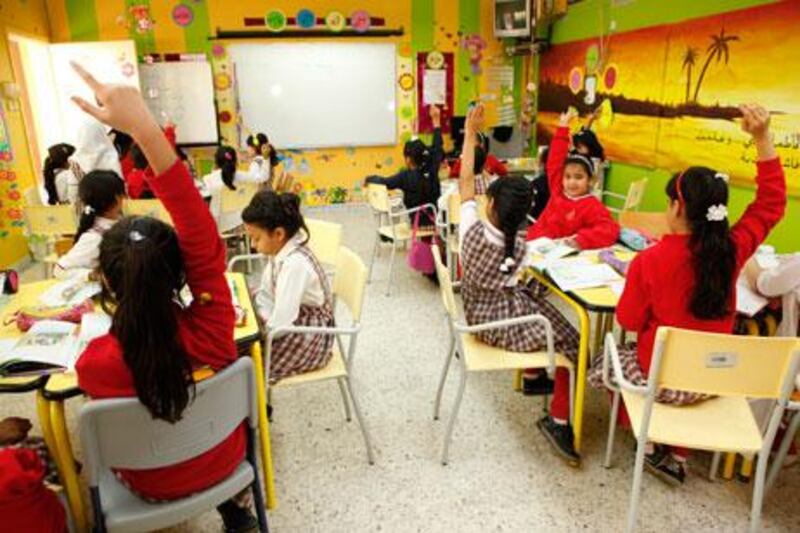DUBAI // Emirati men shun the teaching profession because the work is exhausting and the pay too low, a study suggests.
Of 100 teachers surveyed by the Sharjah Education Zone last year, 82 said it was a tiring job and 95 said they did not receive timely salary increments.
Amna Mohammed Al Rashid, the head of training and development for the zone and author of the study, said teaching was a profession not highly regarded by the local population.
“We need more male Emirati teachers, but what holds them back is its status and the poor salary.
“Almost 70 per cent of the teachers surveyed said that it’s not a respectable job for men.”
She said the other issues highlighted in her study were the end-of-service pension plan and the lack of health insurance.
In universities, Ms Al Rashid found the number of men being trained for teaching had dropped from 45 in 2010 to 13 in 2011.
Ali Mihad Al Suwaidi, assistant undersecretary at the Ministry of Education, said encouraging men to join state schools was one their biggest challenges. “We do not have a problem when it comes to women,” he said. “A majority of the female teachers in state schools are Emirati. But it’s a different story when it comes to men. This has been a constant issue.”
Only 4 per cent of the 12,417 Emiratis who teach in state schools are men, and schools had a shortfall of 800 teachers at the start of the last academic year – a shortage officials say they experience annually.
Altogether, there are 683 male teachers in Sharjah state schools. Emirati men constitute just 2 per cent of that group.
“We have obstacles when it comes to hiring in subjects like sports, PE and art,” said Mr Al Suwaidi.“So we have to rely on expatriate teachers.”
At the secondary school level, he said, there was a shortage of teachers for mathematics and science. “The majority of pupils do not take science courses in school and we need to encourage them towards those careers.”
Michael O’Brien, associate academic dean of education at the federal Higher Colleges of Technology, said part of the shortage can be overcome by speeding up the recruitment process. “The quicker our young graduates get into schools the better the opportunity of getting them to stay on,” he said.
“It can take six months or longer before they are offered a position. Some of our graduates go off to do something else in that time.”
Mr O’Brien said all their 30 graduates in the capital were immediately snapped up by the Abu Dhabi Education Council after a recent agreement with the federal universities.
“That is exactly the process we would like to have operating with the other education zones. We are working with the ministry to replicate the process,” he added.
The HCT produces 100 bilingual graduates, trained in primary school methods, every year.
“We can do our bit in providing enthusiastic new graduates trained in the latest methods and keen workers in the classroom. But we need a process that gets them in there as quickly as possible.”
HCT does not currently have any male students on its roll but Mr O’Brien said it plans to start new programmes, in health and physical education for example, that might bring them in.
[ aahmed@thenational.ae ]






